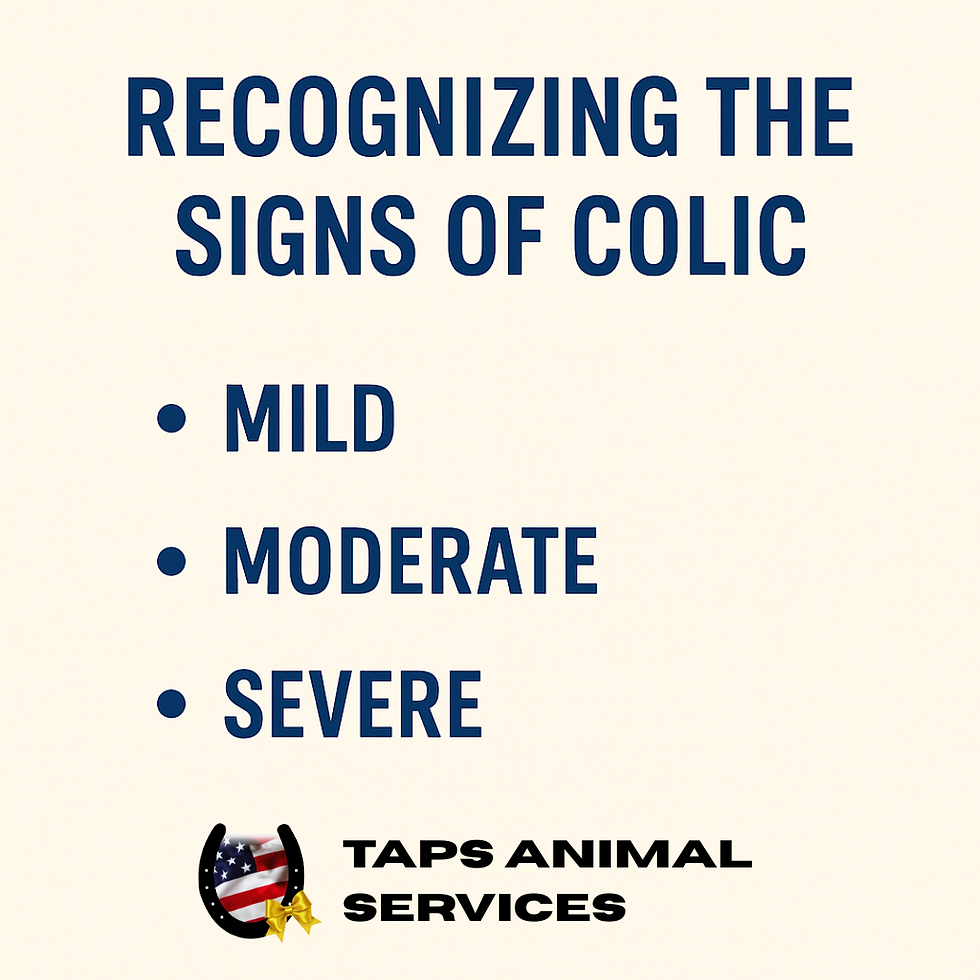Colic in Horses: What Every Horse Owner Should Know
- Laura Kirk

- Jun 9, 2025
- 3 min read
Colic. It's a word that can strike fear into the heart of any horse owner. And for good reason—colic, which refers to abdominal pain in horses, can range from mild discomfort to life-threatening emergencies. But knowing what to look for, what steps to take, and how to work closely with your veterinarian can make all the difference.

What Is Colic?
Colic is not a single disease but rather a symptom of something wrong in the gastrointestinal system. It can be caused by gas buildup, intestinal blockage, parasites, dietary changes, stress, or even twisted intestines. While some types of colic are mild and resolve with simple care, others can require urgent surgical intervention.
Signs of Colic in Horses
Recognizing the signs of colic early is key to a better outcome. While symptoms can vary from horse to horse, here are some of the most common:
Pawing at the ground
Looking at or biting the flank
Repeatedly lying down and getting up
Rolling or thrashing
Kicking at the belly
Stretching out as if to urinate
Lack of interest in food
Little or no manure production
Sweating, trembling, or signs of anxiety
Elevated heart rate (above 50 bpm)
Dark or tacky gums
Every horse is different, so trust your gut—if your horse seems “off,” it’s worth paying attention.
What to Do if You Think Your Horse Has Colic
Step 1: Call Your Veterinarian Immediately
Even if the symptoms seem minor, don’t wait. Colic can escalate quickly. Give your vet detailed information—how long the symptoms have been going on, changes in feed or routine, and any treatments already given.
Step 2: Keep Your Horse Safe
If your horse is rolling violently, try to keep them in a safe, confined area away from obstacles. Don’t risk your safety trying to force them to stand—just ensure they’re not at risk of injury.
Step 3: Don’t Feed
Withhold food until your vet arrives and gives the go-ahead. Access to clean, fresh water is fine unless your vet advises otherwise.
Step 4: Monitor and Record
Note manure output, heart rate, breathing, and any visible changes. This helps your vet make a quicker, more accurate diagnosis.
Treatment Options: What to Expect
Your vet will perform a thorough physical exam and may use diagnostic tools such as:
Nasogastric intubation (to relieve pressure or administer fluids)
Rectal exam
Abdominal ultrasound
Blood work
Medical Management
Most cases respond well to medical treatment, which may include:
Pain relief (e.g., Banamine)
Fluid therapy (oral or IV)
Laxatives or mineral oil
Sedation to keep the horse calm
Surgical Intervention
In more serious cases—such as intestinal twists, severe impactions, or displacements—surgery may be required. Prompt action can be life-saving.
Your vet will guide you through this decision, and many horses go on to make full recoveries after surgery with appropriate aftercare and rest.
Q&A: Colic Concerns from Caring Horse Owners
Q: Can colic be prevented?
A: While not all colic is preventable, you can reduce risk by maintaining a consistent feeding schedule, avoiding sudden changes in diet, ensuring access to clean water, regular dental care, deworming, and plenty of turnout.
Q: Should I walk my horse if they’re colicking?
A: Gentle walking may help prevent rolling, but don’t overdo it. If your horse is calm, it’s okay to let them lie down. Prioritize safety for both of you.
Q: How serious is colic?
A: It depends on the type. Some forms are mild and treatable on the farm; others require urgent care. Always call your vet—early action can save your horse’s life.
In Closing
We know how deeply you care for your horse. Colic can be a frightening experience, but with a watchful eye and a quick call to your vet, you're doing the very best for your equine friend. At Taps, we honor the bond between people and animals—whether you're navigating wellness, aging, or moments of crisis, we’re here to walk alongside you with compassion and care.
If you ever have concerns or questions about your horse's health, don't hesitate to reach out to your veterinarian. And when the time comes for difficult decisions, know that Taps is here with gentle support and respectful service.


Comments